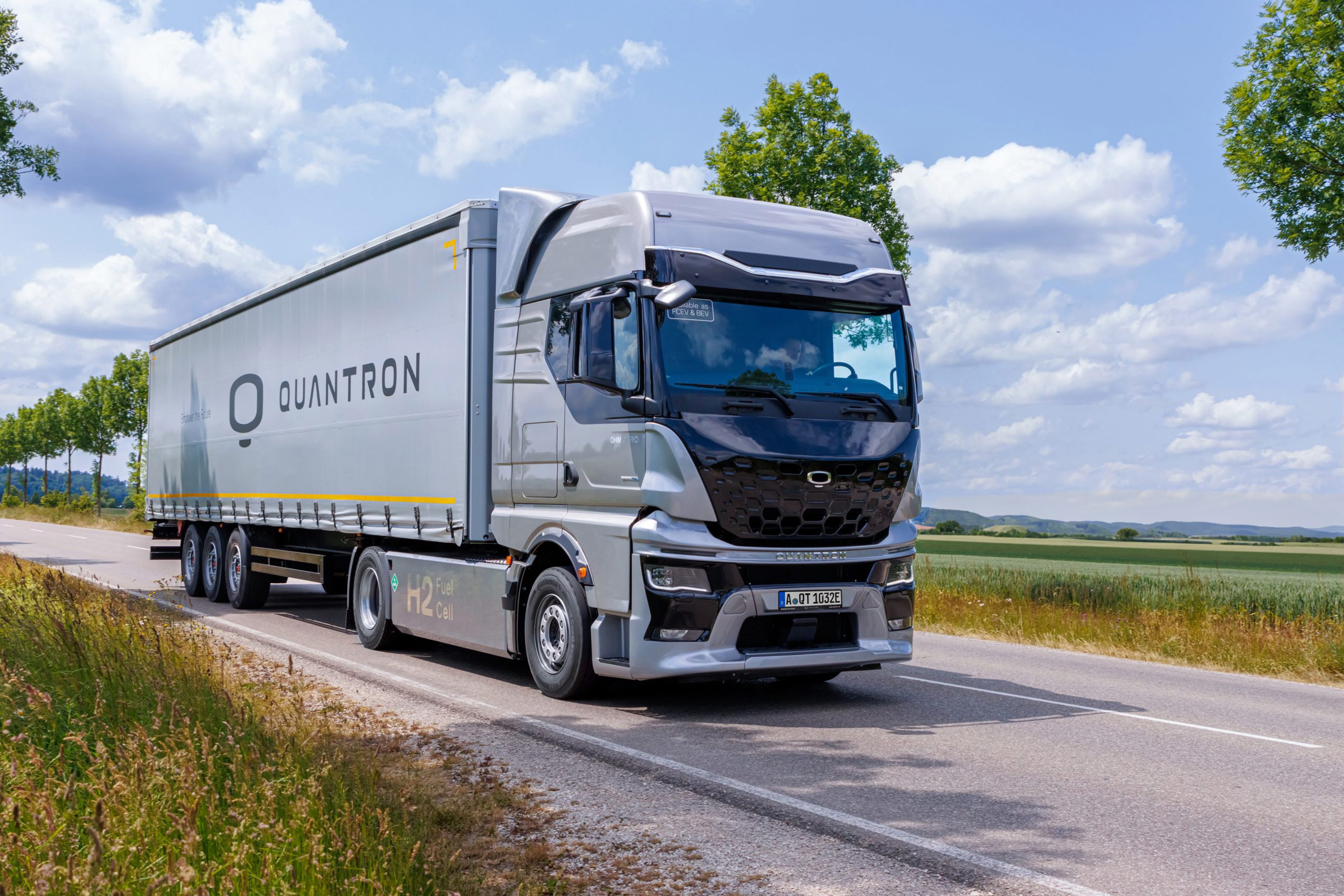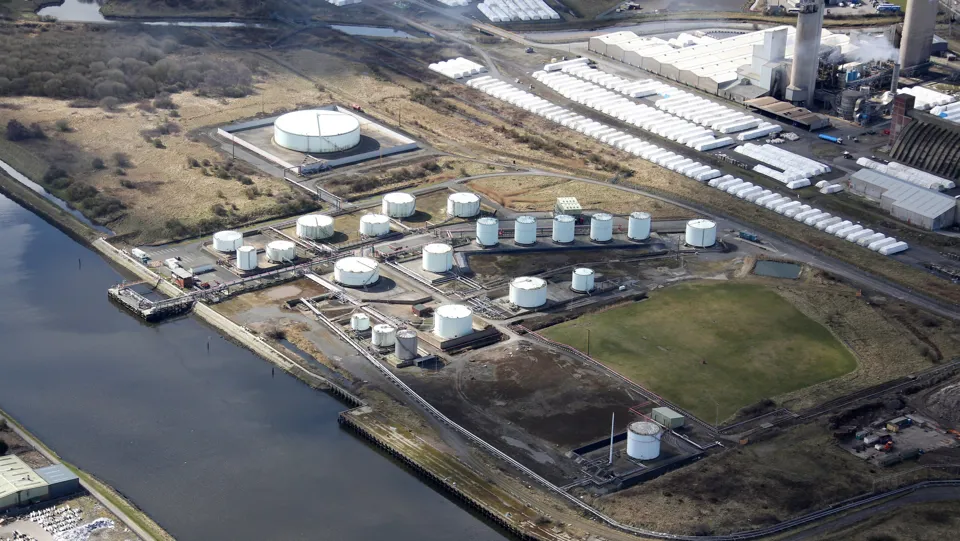A publicly accessible hydrogen refuelling station will be built in the north-east of England to support a fleet of fuel-cell heavy goods vehicles (HGVs).
The Government has awarded £7 million to the project which will see fuel distributer Exolum build the new hydrogen filling station near Middlesbrough at the intersection of the A19 and A66.
Initially serving at least 25 new, zero-emission HGVs making deliveries from supermarket groceries to new clothes, it will be capable of dispensing up to 1.5 tonnes of hydrogen per day.
Part of the £7m project, the Tees Valley Hydrogen Vehicle Ecosystem (HYVE) Consortium, which has been charged with deploying the hydrogen-powered electric trucks, receives £2.1m.
HGV leasing partner within the consortium, Novuna Vehicle Solutions will work alongside German manufacturer Quantron AG, to build, fund and manage the in-life maintenance of more than 20 fuel cell electric HGVs ranging from 4.2 to 27 tonnes deployed in the project.
Electra Commercial Vehicles, meanwhile, will be providing nine fuel-cell HGVs from 19 - 27 tonnes, alongside Novuna and Quantron, on the back of its successful trial of the UK's first fuel-cell truck produced during phase one of the Tees Valley project.
It saw the Blackburn-based business build the UK’s first 19 tonne refrigerated fuel-cell truck, demonstrated over a three-month period with a major supermarket prior to Christmas 2022.
Following on from that success, it joined the consortium with Exolum and Novuna to bid for phase two.
Novuna Vehicle Solutions, which manages more than 140,000 vehicles across the UK and Europe, ranging from cars and vans to HGVs and specialised assets, is also currently in discussion to support separate trials of hydrogen vehicles for Network Rail.
Jon Lawes, managing director of Novuna Vehicle Solutions, said: “This project is crucial to removing barriers and addressing the needs of operators at every stage of the ecosystem, in turn realising the commercial viability of hydrogen, at scale, and transforming the heavy transport sector which has been left behind in the road to net zero fleets.
“With our experience and unique capability to build, fund and manage the in-life maintenance across all vehicle types, including HGVs, we’re looking forward to collaborating with other selected participants to create a cleaner transport sector and ultimately unlock the vast potential of fuel cell hydrogen vehicles.”

The project, part of the Tees Valley Hydrogen Transport Hub, follows funding announced last year for hydrogen infrastructure.
Element 2 and ULEMCo received a share of £8m to create four new publicly accessible hydrogen refuelling stations, and develop hydrogen-powered airport ground-based support vehicles, such as tow trucks for aeroplanes and sweepers to clean runways.
To further support the sector, Tees Valley Combined Authority will use £300,000 of Government funding to run a competition for Tees Valley colleges and training institutions to purchase hydrogen training equipment to upskill the local workforce.
Technology and decarbonisation minister, Anthony Browne, said: “It’s fantastic to see the Tees Valley continue to be a trailblazer in this vital technology to decarbonise heavier vehicles – leading the way for the wider rollout of green hydrogen.”
The Hydrogen Transport Hub is already creating significant levels of industry interest, according to the Department for Transport (DfT), with a number of developers having announced their intentions to build large scale green hydrogen production in the area, with demand from transport a key factor.
Tees Valley Mayor Ben Houchen said: “As the UK’s first Hydrogen Transport Hub we are in a fantastic position to take advantage of projects such as this, which will deliver further jobs and investment needed to drive our local economy forward.
“As more of these major projects are confirmed, it’s also essential that we develop skills in our workforce so this funding is vital to ensure local people can take advantage of the well-paid jobs this new technology is bringing.”
The funding of the three projects completes the second round of Government competition funding for the Tees Valley Hydrogen Transport Hub.
The first round awarded more £2.6m to deploy 21 hydrogen-powered vehicles. The second competition invited ideas on how to overcome some of the challenges of scaling-up hydrogen technology, making the region’s supply chain greener with hydrogen-fuelled vans and HGVs.
Dom Tribe, partner and automotive sector specialist at management consultancy, Vendigital, said: "Where batteries/EVs cannot economically, or technically, deliver the best zero-carbon solution, the UK needs to invest in alternative areas for specific applications, such as HGVs.
“The demand that this new publicly-available refuelling station will create from fuel-cell HGVs operating in the north east will increase momentum and help to draw down further investment for large-scale green hydrogen production.”
He added: “With net-zero goals nearing, it is clear that decarbonising the heavy-duty transport sector is hugely challenging.
"Statistics suggest that HGVs in the UK were responsible for 21.4 million metric tons of carbon dioxide emissions in 2021, which was 9.2% more than the previous year – so things have been moving in the wrong direction.
“Decarbonising HGV deliveries across the UK will require much more than competition funding delivered on a project-by-project basis, it will require significant investment over a sustained time period in the large-scale production of green hydrogen, and the infrastructure to support its use.
"From a value chain perspective, there is also an urgent need to upskill workers to meet the hydrogen transport challenge.”





















Login to comment
Comments
No comments have been made yet.